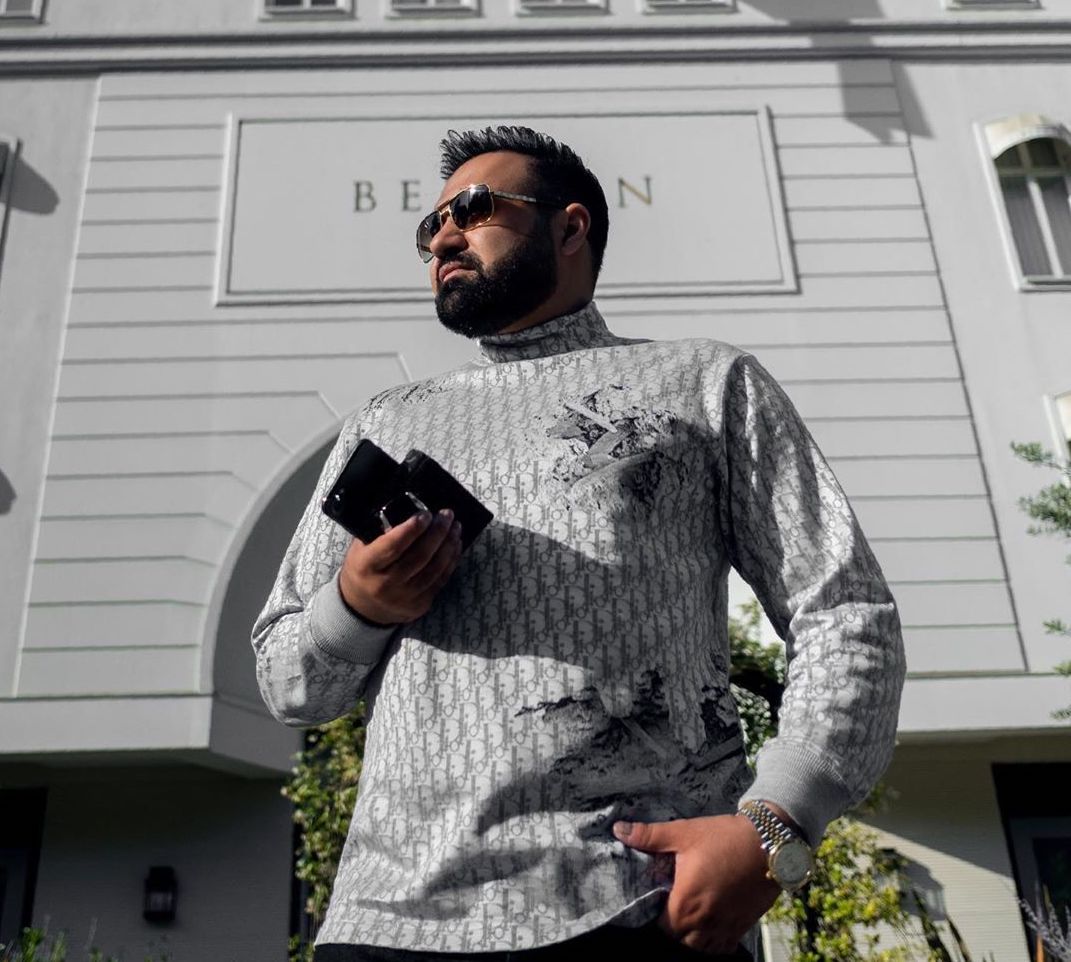Business
Amer Safaee talks Business and going all in on your Ambitions

Amer Safaee has built a global business despite coming from a poor background and being raised in war-torn Afghanistan.
An unlikely success story, Safaee today is an entrepreneur and investor with a multinational business, and he’s not afraid of taking risks. Because it takes a certain kind of mindset to go from nothing in order to get to where you want to be.
Raised in Daykundi in Afghanistan, Safaee comes from a family that didn’t have the financial means to support him. Starting from the ground up, Safaee built his successful business, Bama Group, to make a difference in the world and bring his passions to the forefront.
Bama Group helps businesses with data security and provides solutions to support their growth by protecting them from the growing threat of cyberattacks, malware and sophisticated hacking attempts. With enterprise customers around the world from the UK to Germany, Dubai and Turkey – Bama Group has been built from the ground up.
“One of the main things about my success is I didn’t get scared to take risks,” says Safaee.
The entrepreneur also encourages a healthy lifestyle and goes against the traditional mindset of work, work, work: “To keep a work-life balance is the key.”
Opting for a healthy diet, and relaxing after a long day’s work, Safaee enjoys a walk and has a passion for horse riding. Living in Dubai, the entrepreneur travels the world and enjoys a lifestyle that many aspire to have, but have yet to fully embrace their potential.

Despite facing challenges in his life, Safaee encourages people to look at the bigger picture and that failure is an important part of the process: “I never give up from failures.” And despite many setbacks throughout his career, Amer Safaee has always remained committed to the bigger idea of where he wants to go: “No matter what happens, you can’t give up. You need to find a solution to any problem and always appreciate what you have already achieved.”
Working in multiple countries including Dubai, Turkey, the United Kingdom and Germany, Safaee has a unique understanding of international business, and it is this perspective that has led him to appreciating all that life has to offer. And for many entrepreneurs, seeing the bigger picture can often be challenging, especially when you are starting from nothing.
Safaee points out that he started with “zero financial support” and that for keen business minds, it is possible to succeed and to create wealth for oneself. “You just need to decide and start.”
Business
High Volume, High Value: The Business Logic Behind Black Banx’s Growth

In fintech, success no longer hinges on legacy prestige or brick-and-mortar branches—it’s about speed, scale, and precision. Black Banx, under the leadership of founder and CEO Michael Gastauer, has exemplified this model, turning its high-volume approach into high-value results.
The company’s Q1 2025 performance tells the story: $1.6 billion in pre-tax profit, $4.3 billion in revenue, and 9 million new customers added, bringing its total customer base to 78 million across 180+ countries.
But behind the numbers lies a carefully calibrated business model built for exponential growth. Here’s how Black Banx’s strategy of scale is redefining what profitable banking looks like in the digital age.
Scaling at Speed: Why Volume Matters
Unlike traditional banks, which often focus on deepening relationships with a limited set of customers, Black Banx thrives on breadth and transactional frequency. Its digital infrastructure supports onboarding millions of users instantly, with zero physical presence required. Customers can open accounts within minutes and transact across 28 fiat currencies and 2 cryptocurrencies (Bitcoin and Ethereum) from anywhere in the world.
Each customer interaction—whether it’s a cross-border transfer, crypto exchange, or FX transaction—feeds directly into Black Banx’s revenue engine. At scale, these micro-interactions yield macro results.
Real-Time, Global Payments at the Core
One of Black Banx’s most powerful value propositions is real-time cross-border payments. By enabling instant fund transfers across currencies and countries, the platform removes the frictions associated with SWIFT-based systems and legacy banking networks.
This service, used by individuals and businesses alike, generates:
- Volume-based revenue from transaction fees
- Exchange spreads on currency conversion
- Premium service income from business clients managing international payroll or vendor payments
With operations in underserved regions like Africa, South Asia, and Latin America, Black Banx is not only increasing volume—it’s tapping into fast-growing financial ecosystems overlooked by legacy banks.
The Flywheel Effect of Crypto Integration
Crypto capabilities have added another dimension to the company’s high-volume model. As of Q1 2025, 20% of all Black Banx transactions involved cryptocurrency, including:
- Crypto-to-fiat and fiat-to-crypto exchanges
- Crypto deposits and withdrawals
- Payments using Bitcoin or Ethereum
The crypto integration attracts both retail users and blockchain-native businesses, enabling them to:
- Access traditional banking rails
- Convert assets seamlessly
- Operate with lower transaction fees than those found in standard financial systems
By being one of the few regulated platforms offering full banking and crypto support, Black Banx is monetizing the convergence of two financial worlds.
Optimized for Operational Efficiency
High volume is only profitable when costs are contained—and Black Banx has engineered its operations to be lean from day one. With a cost-to-income ratio of just 63% in Q1 2025, it operates significantly more efficiently than most global banks.
Key enablers of this cost efficiency include:
- AI-driven compliance and customer support
- Cloud-native architecture
- Automated onboarding and KYC processes
- Digital-only servicing without expensive physical infrastructure
The outcome is a platform that not only scales, but does so without sacrificing margin—each new customer contributes to profit rather than diluting it.
Business Clients: The Value Multiplier
While Black Banx’s massive customer base is largely consumer-driven, its business clients are high-value accelerators. From SMEs and startups to crypto firms and global freelancers, businesses use Black Banx for:
- International transactions
- Multi-currency payroll
- Crypto-fiat settlements
- Supplier payments and invoicing
These clients tend to:
- Transact more frequently
- Use a broader range of services
- Generate significantly higher revenue per user
Moreover, Black Banx’s API integrations and tailored enterprise solutions lock in these clients for the long term, reinforcing predictable and scalable growth.
Monetizing the Ecosystem, Not Just the Account
The genius of Black Banx’s model is that it monetizes not just accounts, but entire customer journeys. A user might:
- Onboard in minutes
- Deposit funds from a crypto wallet
- Exchange currencies
- Pay an overseas vendor
- Withdraw to a local bank account
Each of these actions touches a different monetization lever—FX spread, transaction fee, crypto conversion, or premium service charge. With 78 million customers doing variations of this at global scale, the cumulative financial impact becomes immense.
Strategic Expansion, Not Blind Growth
Unlike many fintechs that chase customer acquisition without a clear monetization path, Black Banx aligns its growth with strategic market opportunities. Its expansion into underbanked and high-demand markets ensures that:
- Customer acquisition costs stay low
- Services meet genuine needs (e.g., cross-border income, crypto access)
- Revenue per user grows over time
It’s not just about acquiring more customers—it’s about acquiring the right customers, in the right markets, with the right needs.
The Future Belongs to Scalable Banking
Black Banx’s ability to transform high-volume engagement into high-value profitability is more than just a fintech success—it’s a signal of what the future of banking looks like. In a world where agility, efficiency, and inclusion define competitive advantage, Black Banx has created a blueprint for digital banking dominance.
With $1.6 billion in quarterly profit, nearly 80 million users, and services that span the globe and the blockchain, the company is no longer just scaling—it’s compounding. Each new user, each transaction, and each feature builds upon the last.
This is not the story of a bank growing.
This is the story of a bank accelerating.
-

 Tech4 years ago
Tech4 years agoEffuel Reviews (2021) – Effuel ECO OBD2 Saves Fuel, and Reduce Gas Cost? Effuel Customer Reviews
-

 Tech6 years ago
Tech6 years agoBosch Power Tools India Launches ‘Cordless Matlab Bosch’ Campaign to Demonstrate the Power of Cordless
-

 Lifestyle6 years ago
Lifestyle6 years agoCatholic Cases App brings Church’s Moral Teachings to Androids and iPhones
-

 Lifestyle4 years ago
Lifestyle4 years agoEast Side Hype x Billionaire Boys Club. Hottest New Streetwear Releases in Utah.
-

 Tech7 years ago
Tech7 years agoCloud Buyers & Investors to Profit in the Future
-

 Lifestyle5 years ago
Lifestyle5 years agoThe Midas of Cosmetic Dermatology: Dr. Simon Ourian
-

 Health6 years ago
Health6 years agoCBDistillery Review: Is it a scam?
-

 Entertainment6 years ago
Entertainment6 years agoAvengers Endgame now Available on 123Movies for Download & Streaming for Free
